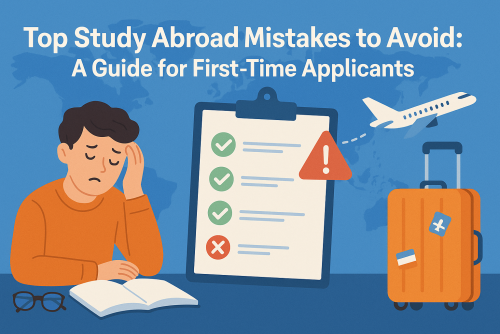
Embarking on a study abroad journey is one of the most exciting decisions in a student’s life. It offers global exposure, academic excellence, and the opportunity to experience new cultures. However, the process can be overwhelming, and first-time applicants often make mistakes that can delay or derail their plans. This guide highlights the most common study abroad mistakes and provides practical advice on how to avoid them.
One of the biggest mistakes students make is choosing a study destination or university without adequate research. Many focus only on popular countries or institutions without understanding factors such as cost of living, visa policies, part-time work options, and post-study opportunities.
Tip: Explore multiple study abroad destinations—for example, Germany, Italy, Australia, or the Czech Republic—and compare their education systems, scholarship programs, and career prospects. Use verified study abroad consultants or student support platforms to make informed choices.
Each university has its own admission criteria, including minimum academic grades, language proficiency tests (like IELTS, TOEFL, or PTE), and document submission deadlines. Some students apply without meeting all requirements, leading to unnecessary rejections.
Tip: Review the eligibility criteria carefully before applying. Prepare your academic transcripts, recommendation letters, and statement of purpose (SOP) in advance. Ensure your English proficiency certificate is valid and matches the required score.
Timing is everything in international admissions. Many applicants underestimate how long it takes to gather documents, apply for scholarships, or process student visas. As a result, they miss deadlines or lose chances for funding.
Tip: Start preparing at least 12 months before intake. Create a clear application timeline that includes steps like researching universities, preparing exams, gathering documents, and applying for visa support.
Studying abroad is a major financial commitment. Students often miscalculate tuition fees, accommodation costs, and living expenses, or forget to account for currency fluctuations.
Tip: Prepare a detailed study abroad budget. Include health insurance, visa fees, travel costs, and emergency funds. Research international scholarships and part-time job opportunities for students to manage expenses effectively.
DIY applications can be risky. Without expert advice, students may choose unsuitable programs or face documentation errors during the visa process.
Tip: Consult a certified study abroad consultant who offers admission guidance, documentation support, and visa counseling. Many experts also assist with university selection, scholarship matching, and career advice.
A well-prepared university application can still fail if visa documentation is incomplete or inaccurate. Students sometimes submit outdated financial statements or incomplete travel documents.
Tip: Double-check all student visa requirements for your destination country. Maintain clear proof of funds, university acceptance, and accommodation details. Attend your visa interview confidently, supported by authentic documentation.
Even when studying in English-taught programs, adjusting to a new country’s language, customs, and academic culture can be challenging. Many students experience culture shock or difficulty in communication during their first months abroad.
Tip: Learn the basics of the local language and research cultural norms before you travel. Join international student communities to build connections and get peer support.
A successful study abroad experience should also include future planning. Students sometimes overlook the country’s post-study work visa policies or the availability of internships and job placements.
Tip: Research the career pathways associated with your course. Some countries like Germany and Australia allow extended post-study stays for graduates. Choose programs with strong industry links and internship opportunities.
Studying abroad can transform your academic and professional future—but only if you plan wisely. Avoiding these common mistakes ensures a smoother journey from application to graduation. Do your research, stay organized, and seek expert advice whenever possible. Remember, the key to success in your study abroad journey lies in preparation, patience, and perseverance.